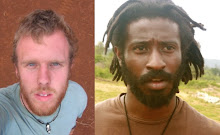Often, “privilege” in our society is defined in terms of money or an exclusive social status that grants you access to VIP rooms, first class, and luxury accommodations. A few days ago however, my privilege was walking several miles through ankle deep mud in the middle of a moonless night in rural Rwanda.
After five months of living in the small town of Nyamata, Amir and I have established many close relationships with friends who have graciously offered us access to stories that are often difficult to hear. These are stories of brutality, loss, and immense suffering. But amidst the pain, there are often glimmers of reconciliation and hope.
On Easter, we were invited by a friend to an overnight commemoration ceremony in his hometown of Kibuye, where he (and several others I know well) watched their entire families brutally murdered with common tools such as machetes, axes, and hammers. Like most survivors we have met in Rwanda, he knows the people who killed his family personally.
As we trudged through the long muddy path up an enormous hill with no light to guide us, I felt a profound sense of privilege. These people had asked us to join them on a very personal journey and to share in their stories. This had particular significance to me as the only white person present.
As we reached the top of the hill, we joined many others who were sitting around an enormous fire and sharing stories in hushed and heavy tones. As the night progressed, these stories were shared more publicly through music, short films projected on a screen, and personal testimonies given by individuals using a microphone. At about 1:30 a.m., candles were passed around and a portion of the crowd gathered in a tight circle around the fire. These were survivors coming together to bear witness to each other’s grief. One by one, they went around the circle describing in as much detail as they could muster the gruesome horrors they witnessed and atrocities they themselves experienced. Nearly every story included seeing firsthand the deaths of family and close friends. After each recollection, the others responded with a stanza from a song whose main chorus proclaimed with striking simplicity: “Remember.”
Recalling these events seemed very important to the survivors. The phrases “never forget” and “never again” have been thrown around so much since the genocide that it feels like many have forgotten their true meanings, especially with the former. I had forgotten myself until that night. Obviously, understanding the past is crucial to understanding the present, and how to best move forward. But proclaiming these memories aloud also empowers and provides some level of healing to the survivors. In many cases, this is the only action they can pursue to ensure their loved ones did not die in vain and that their stories did not die with them. “Commemorate” means “to honor the memory of.” Proclaiming the truth about the circumstances of their deaths certainly honors their memory, and by having others listen, the survivors have more reason to hope that the same atrocities will not happen again.
In a way, I believe I witnessed an Easter miracle on Sunday night: a miracle of hope in the face of immense trauma and suffering, a miracle of remembrance, and a miracle of the power of bearing witness. I am posting a short film clip from this experience to give you a chance to share in that witness. I was invited to film this event because these people want their stories told. They want the rest of the world to hear their stories and stand with them in solidarity to face the struggles of moving forward together. Watching this clip will not be easy and it will not be for everyone. But after having this experience and refining my understanding of the purpose of commemoration, I absolutely must provide that opportunity.
This was the first Easter of my life not to be in a church. For the past four years, I have participated in a beautiful Easter vigil in which the liturgy coincided with the rising of the sun. The service began in darkness with readings about creation and the valley of dry bones, picking up momentum until the first shouts of “Alleluia” were proclaimed with the first shining rays of light.
This year, I had the immense privilege to witness a different vigil. However, the movement of the “liturgy” was the same. And as the sun peaked over the rolling hills of Kibuye, I knew my Rwandan friends had found a glimmer of the risen Christ in the same way as you and I do every day: through each other.

No comments:
Post a Comment